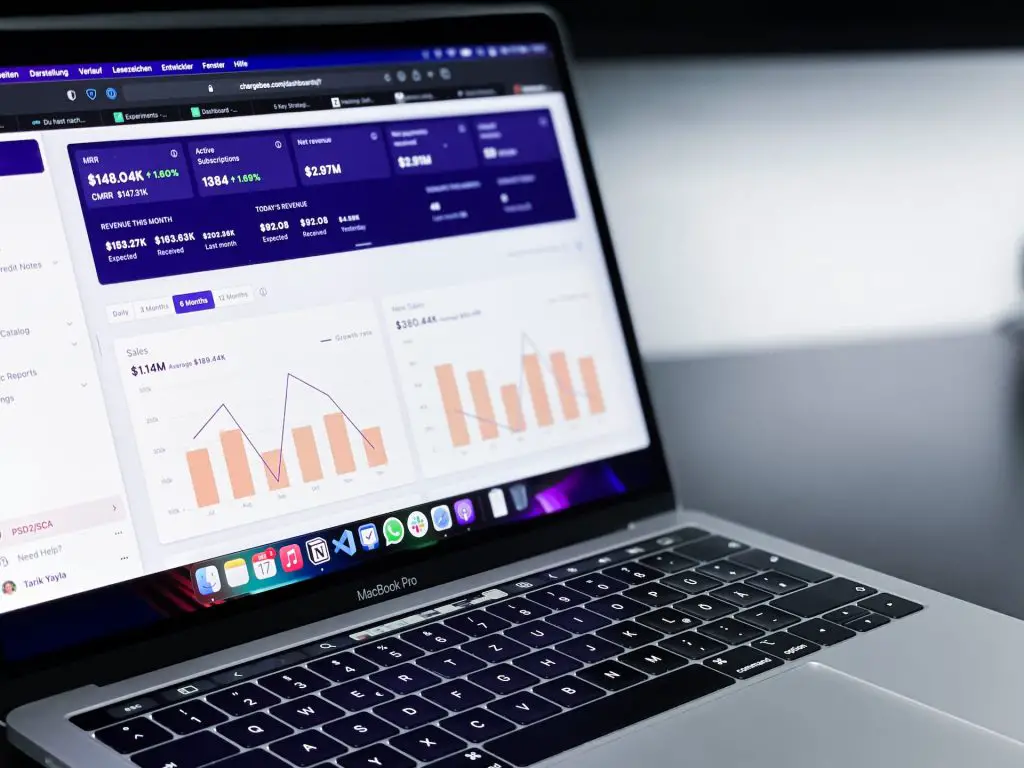Are you tired of spending countless hours on repetitive marketing tasks, struggling to keep up with the ever-changing digital landscape? Imagine if you could automate your marketing efforts, freeing up time to focus on strategy and creativity while boosting your return on investment (ROI). This is where marketing automation comes in, a game-changer for businesses of all sizes. In this blog post, we’ll explore the world of automated marketing definition, delve into its key components, reveal its benefits, and guide you in choosing the right solution for your business.
Key Takeaways
- Marketing Automation leverages technology to improve and expedite marketing activities, resulting in better lead generation, customer retention & ROI.
- It involves using software for data management/analysis and personalization to create targeted campaigns.
- Best practices include developing a strategy, segmenting campaigns & testing optimization for enhanced engagement with customers.
Understanding Automated Marketing
Marketing automation leverages technology to improve and expedite marketing activities. This not only saves time and resources but also can enrich customer experiences. A strategic approach to marketing automation can empower businesses to accomplish their marketing objectives more effectively.
Marketing automation is instrumental in making marketing automation work by:
- Identifying and converting leads
- Facilitating the hunt for prospective leads
- Minimizing manual work
- Substituting repetitive chores with software solutions
- Allowing marketers to concentrate on their marketing automation strategy, content, and creative problem-solving.
Marketing automation also involves enhancing customer experience by uniting teams, collecting data, automating routine tasks, analyzing customer behavior to tailor messaging, identifying and converting leads, evaluating performance, and crafting targeted campaigns that cater to customer needs. The advantages of marketing automation include better lead generation and conversion, increased customer retention and loyalty, boosted ROI and cost efficiency, and better resources to understand marketing automation better.
The Definition of Automated Marketing
Automated marketing involves using software and tools to automate recurring tasks, examine data, and customize customer interactions. It enables businesses to streamline processes, target customers with automated marketing messages across various channels, and manage marketing processes and campaigns in an automated fashion.
The best marketing automation software should provide essential elements such as marketing automation software, integration with CRM systems, data analysis, and personalization to businesses.
The Role of Automation in Marketing
Automation is essential for marketing, as it allows businesses to implement intricate strategies, target particular audience segments, and concentrate on more advanced tasks. Automation can facilitate the automation of repetitive tasks, enable the creation of targeted campaigns, and provide the capability to track and optimize performance.
Applying marketing automation can enhance lead generation and conversion, boost customer retention and loyalty, and improve ROI and cost efficiency, thereby becoming an invaluable resource for marketing departments.
Key Components of Marketing Automation
Marketing automation consists of three core components:
- Software: Utilized to streamline routine tasks, including email campaigns, targeted campaigns, and tracking and optimizing performance.
- CRM integration Allows seamless integration with customer relationship management systems to enhance data management and customer segmentation.
- Data analysis for personalization: Enables customer data analysis to create personalized and targeted marketing campaigns.
CRM integration facilitates the automation of customer data collection, segmentation, and personalization of campaigns. Data analysis for personalization facilitates the evaluation of customer data to generate more targeted campaigns and enhance customer retention and loyalty.
Marketing Automation Software
Marketing automation software offers the ability to execute repetitive tasks, manage campaigns, and provide insights to enhance customer engagement and conversions. One of the key features of marketing automation software is lead scoring, which assigns points to each lead action, helping to identify warm leads and pass them on to the sales team for follow-up.
This enables marketing teams to evaluate leads based on their propensity to purchase your product, resulting in more effective lead nurturing and increased conversions.
Integration with CRM Systems
Integration with CRM systems enables marketing automation tools to:
- Access customer data
- Facilitate the delivery of targeted and personalized campaigns
- Automate workflows
- Improve the overall CRM experience
This connection enables data flow to, from, or between CRM software and other applications and systems.
In marketing automation, integration is paramount to allow the software to mesh with existing tools, guaranteeing optimal effectiveness and efficiency across all marketing channels.
Data Analysis and Personalization
Data analysis and personalization are integral to the success of marketing automation. By analyzing data in software such as Google Analytics, marketers can gain insights into customer behavior, preferences, and trends, while personalization facilitates the delivery of tailored marketing messages and offers. Together, they enable data-driven decision-making and the delivery of targeted messages to achieve desired outcomes.

By understanding customer behavior and preferences, businesses can create more effective and engaging campaigns, leading to higher conversion rates and customer loyalty.
How Marketing Automation Streamlines Processes
Marketing automation facilitates streamlined processes by automating repetitive tasks, generating targeted campaigns, and monitoring and enhancing performance. By automating email marketing automation, social media posting, and ad campaigns, marketing automation allows marketers to focus on higher-level tasks and the tactical side of lead nurturing and customer retention.
Additionally, marketing automation can boost employee productivity by eradicating routine, repetitive tasks, freeing them up to focus on more strategic issues.
Automating Repetitive Tasks
Automating repetitive tasks can help conserve time and resources, enabling marketers to allocate their attention to more strategic objectives. Marketing automation facilitates various tasks such as:
- Email marketing
- Behavioral targeting
- Lead prioritization
- Personalized advertising
- Social media posts
- Newsletter sign-ups
- Email personalization
By unburdening marketers of these daily tasks, marketing automation assists businesses in becoming more efficient and effective in their marketing endeavors.
Targeted Campaigns
Targeted campaigns are designed to be relevant to a particular audience or segment, facilitated by marketing automation, enabling marketers to provide personalized content at the appropriate time on the appropriate channel.
Utilizing a marketing automation platform for campaigns offers several advantages, including delivering personalized content at the appropriate time and on the appropriate channel, which can be difficult to achieve manually in an omnichannel digital marketing context.
These targeted campaigns offer multiple advantages, such as enhanced relevance, higher ROI, conversion rates, cost-effectiveness, personalization, and improved insights.
Performance Tracking and Optimization
Performance tracking and optimization involve:
- Measuring and analyzing the performance of marketing campaigns and strategies
- Identifying successful strategies and making data-driven decisions
- Tracking website analytics
- Measuring customer engagement
- Utilizing A/B testing
By implementing these practices, businesses can optimize their marketing efforts for maximum efficiency and effectiveness.

Performance tracking and optimization can result in improved lead generation and conversion, increased ROI and cost efficiency, and enhanced customer retention and loyalty.
Benefits of Implementing Marketing Automation
Implementing marketing automation can result in numerous benefits, including enhanced lead generation, improved customer retention, and increased ROI. Tick King, a retail-based watch repair specialist, decreased their monthly advertising expenditure by £400. There was a remarkable impact as online inquiries rose by 327% and web visitors increased by 143%.
By capitalizing on the capabilities of marketing automation, businesses can accomplish noteworthy advancements in their marketing initiatives and overall performance.
Enhanced Lead Generation and Conversion
Marketing automation helps businesses generate and convert leads more effectively through personalized and targeted campaigns. Marketing automation can improve lead generation and conversion rates by constructing more robust leads and optimizing lead management through lead scoring and tracking techniques.
Enhanced lead generation and conversion result in heightened business sales and revenue, rendering marketing automation a vital instrument for growth and success.
Improved Customer Retention and Loyalty
Marketing automation has the potential to foster customer relationships through pertinent content and communication, thus resulting in improved retention and loyalty. By understanding customer preferences and delivering relevant content at the right time, businesses can build stronger connections with their audience, increasing customer satisfaction and loyalty. So, how does marketing automation play a crucial role in this process?
This benefits the business in terms of revenue and helps build a strong brand reputation in the market.
Increased ROI and Cost Efficiency
One of the benefits of marketing automation is the potential for improved ROI and cost efficiency through the automation of tasks, refinement of campaigns, and optimal utilization of marketing budget. By streamlining processes and eliminating manual tasks, marketing automation enables businesses to allocate resources more effectively, resulting in cost savings and improved profitability.

Additionally, the insights gained from performance tracking and optimization can lead to better decision-making and more successful marketing strategies, increasing ROI and cost efficiency.
Choosing the Right Marketing Automation Solution
Selecting the right marketing automation solution involves considering the objectives of the business, the size of the business, the budget, and the resources available. To make an informed decision, evaluating various marketing automation solutions based on their features, pricing, and compatibility with existing systems is important.
The following segment will delineate the principal steps in selecting the appropriate marketing automation solution for your business.
Assessing Business Needs
To identify the specific requirements and goals for implementing marketing automation, businesses should conduct an in-depth evaluation of their existing marketing strategies, familiarize themselves with their target market, and study their competitors.
This assessment will help businesses determine which features and functionalities are most relevant to their needs and objectives, ultimately guiding their decision-making process in selecting the right marketing automation solution.
Comparing Features and Pricing
Comparing features and pricing of various marketing automation tools can help businesses find the best fit for their needs and budget. Some solutions may provide a lower upfront cost but have higher additional fees, while others may have a higher upfront cost but lower additional fees.
It is crucial to concentrate on the features that align most closely with one’s unique needs and objectives, taking into account both initial costs and additional fees when choosing a marketing automation solution.
Ensuring Seamless Integration
Ensuring seamless integration with existing systems, such as CRM and email platforms, is crucial for successful marketing automation implementation. Integration settings must be configured to ensure data is shared between the two systems, enabling more efficient and effective marketing campaigns.
Proper integration will allow for the smooth flow of data between systems and provide a more cohesive and streamlined experience for both the marketing team and the end customer.
Best Practices for Implementing Marketing Automation
Adhering to best practices is crucial to optimize the success of marketing automation implementation. This includes formulating a clear strategy, segmenting and personalizing campaigns, and conducting regular testing and optimization.
By adhering to these best practices, businesses can ensure that their marketing automation efforts align with overall business goals, deliver relevant content to their target audience, and continuously improve through data-driven insights.
Developing a Clear Strategy
A clear marketing strategy is the foundation of a successful marketing automation implementation. By aligning marketing automation efforts with overall business goals and objectives, businesses can ensure that their marketing activities contribute to the growth and success of the company.
Developing a clear strategy involves:
- Understanding the customer journey
- Identifying potential issues that may arise during the integration process
- Setting measurable goals and objectives for the marketing automation implementation.
Segmenting and Personalizing Campaigns
Segmenting and personalizing campaigns involve targeting specific customer segments with tailored messages and offers. By delivering more relevant content and offers to specific audience segments, businesses can enhance engagement and conversion rates, ultimately leading to increased sales and revenue.
Effective segmentation and personalization strategies require a deep understanding of customer preferences, behavior, and demographics, allowing businesses to create highly targeted and impactful marketing campaigns.

Regularly Testing and Optimizing
Regularly testing and optimizing marketing automation efforts is crucial for continuous improvement and success. By monitoring campaign performance and customer engagement and utilizing A/B testing, businesses can identify successful ways to craft and make data-driven marketing strategies.
This cyclical approach to marketing automation ensures continual improvement in marketing endeavors, maintaining a competitive edge and offering the best possible customer experience.
Summary
In conclusion, marketing automation is a powerful tool that can revolutionize how businesses approach their marketing efforts. By automating repetitive tasks, creating targeted campaigns, and tracking performance for optimization, marketing automation can help businesses save time and resources and ultimately boost their ROI. By implementing best practices and selecting the right marketing automation solution, businesses can unlock the full potential of this technology and drive growth and success in the competitive digital landscape. Now is the time to harness the power of marketing automation and propel your business forward.
Frequently Asked Questions
What do you mean by automated marketing?
Marketing automation is a software platform that helps businesses automate their marketing and sales engagement processes to generate more leads, convert them into sales, and optimize ROI by utilizing predetermined campaigns across multiple channels at scheduled intervals. It automates routine marketing tasks without human action, including email marketing, behavioral targeting, lead prioritization, and personalized advertising.
What is an example of a marketing automation strategy?
Sending out surveys to gain feedback after triggers such as purchases is an effective marketing automation strategy. This helps to understand customer needs and adjust strategies accordingly.
What is an automated marketing campaign?
Marketing automation uses software to manage and automate marketing processes and campaigns across multiple channels. It enables businesses to target customers with automated messages, complete repetitive tasks, and execute predetermined campaigns on a scheduled basis. By using marketing automation, businesses can save time and resources, increase efficiency, and improve customer engagement. It can also help to generate more leads, increase conversions, and improve customer loyalty.
What tasks can be automated with marketing automation?
Marketing automation enables efficient automation of email marketing, social media posting, and ad campaigns. It can help businesses save time and money while also allowing them to reach more customers and increase their ROI. Marketers can focus on more creative and business-oriented tasks by automating mundane tasks.
Can marketing automation improve customer retention and loyalty?
Yes, marketing automation can effectively improve customer retention and loyalty by delivering relevant content and engaging in meaningful communication. It can help create personalized customer experiences, which can lead to increased customer satisfaction and loyalty. It can also help automate mundane tasks, freeing time for more important tasks.

